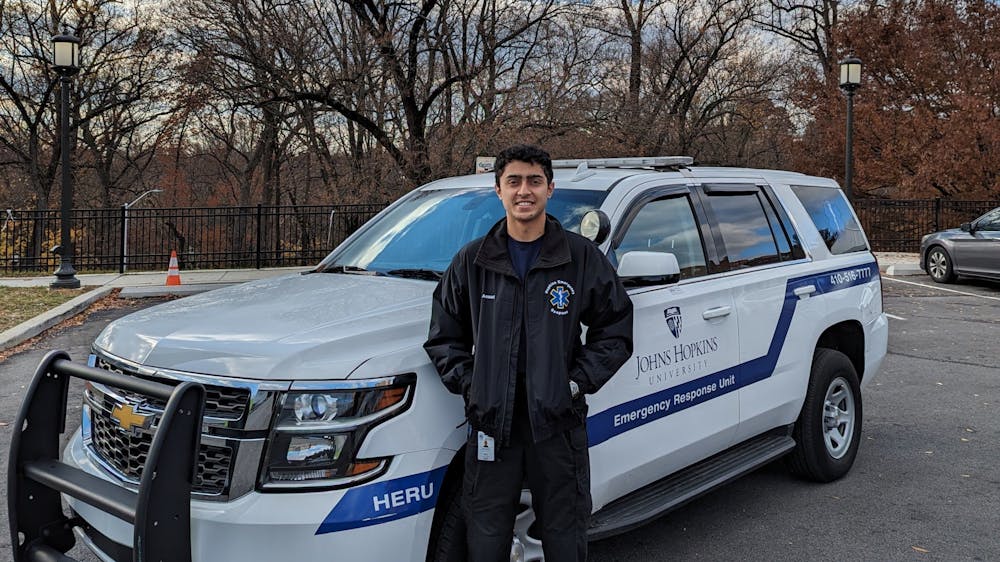Saad Ansari is a senior graduating in December 2023 and majoring in Applied Mathematics and Statistics (AMS) and Computer Science. In an interview with The News-Letter, Ansari described his upbringing in three different countries, his business and work in developing algorithms to detect cancer and his plans to work as a quant trader next fall.
The News-Letter: Tell me a little bit about yourself. Where have you lived, and how have those experiences shaped you?
Saad Ansari: I was born in the States in Texas. I lived there for two years before moving to Western Canada, Alberta. I was there for six years, and then I moved to Qatar and lived there for 10 years, from third grade until I graduated high school. As for how it's shaped me, I feel like I wouldn't have learned Arabic otherwise. Also, I got the opportunity to interact with people from a lot of different places in school. There were students from 80-something countries, and I was lucky to interact with them.
N-L: Why did you decide to come to Hopkins?
SA: When I was in high school, I was set on becoming a doctor. Hopkins really stood out to me; it seemed like a beacon to build up my education. I was majoring in Computer Science as well, and getting a good computer science education was important. At the time I thought it was the perfect fit, and I still think it was a really good idea.
N-L: Why did you decide to drop pre-med, and how will you shape your career from here on out?
SA: I took the Medical College Admission Test the summer after my sophomore year, and while I was studying, I realized that I just really didn't like science that much. My mindset up until then was that I can enjoy the AMS classes for the next four years because I'm not gonna touch math again, but then I talked to people and got other people's perspectives. I realized it was a better idea to explore something a little bit more in that [math] vein. I got an AMS-related internship the following summer, and I liked that a lot.
N-L: How did you get started with your work on an algorithm to detect cancer with a biotech firm in Phoenix?
SA: I was doing research with a professor at [the] Bloomberg [School of Public Health]. He was a professor of Biostatistics and got hired by this biotech firm in Arizona. When he left, he told everyone who was in his lab that, if they wanted, he could make sure [they got] a job. I took the opportunity, and I started working there.
We’re building machine learning algorithms for the early prediction of cancer. Obviously, there's a lot of money and a lot of effort being put toward trying to cure cancer, but if we could figure out that someone has cancer at an earlier stage, then it's much easier to treat. The majority of types of current treatments that we have can get cancer at an early stage, luckily. That's what our lab’s focus is, primarily. The product that we're working on is building to get to the point where you just take a blood test and then can send it off to the lab, where they’ll just need to do some tests to see the percentage chance of you having cancer. This would increase the survival rates of cancer by a lot, as people can take medication and keep planning [with medical professionals].
N-L: Outside of medicine, you mentioned that you want to be a quant trader this August. What does this job entail?
SA: Yeah, I’m going to Chicago [to work as a quant trader] in July or August next year. As for the firm, when you're buying and selling on the stock exchange, you have to buy it from someone and sell it to someone. When you just click “buy” or “sell,“ someone has to fulfill those orders. My firm is called a market maker. They're part of the types of firms that will fulfill those orders. Let's say if you go to the Apple Store and buy an iPhone, it would be around $1,000. If you turn around and try to sell on eBay, you're not going to sell for more than $900, right? There's that $100 earnings. Same thing on the stock exchange for 1 or 2 cents, and you're doing this on a scale of a million trades a day. You can make tens [of] thousands in a short period of time. It's important to be aware of your predictions and analysis of whether it's going to go up or down. Should I be selling more or buying more? That’s my main responsibility.
N-L: You also have your own business with $25,000 in revenue. How did it start, and what do you do?
SA: I started reselling shoes, mainly sneakers and streetwear, in [my] freshman year, September 2020. I wanted to legitimize it, so I gave it a name, Blue Jay Kicks. I made an Instagram account for it and started selling. It's like a hobby of mine as well, and I see a lot of sneakers that I’d never get to see in person. I think Blue Jay Kicks is probably gonna die down now though, especially with me working a full-time job.





